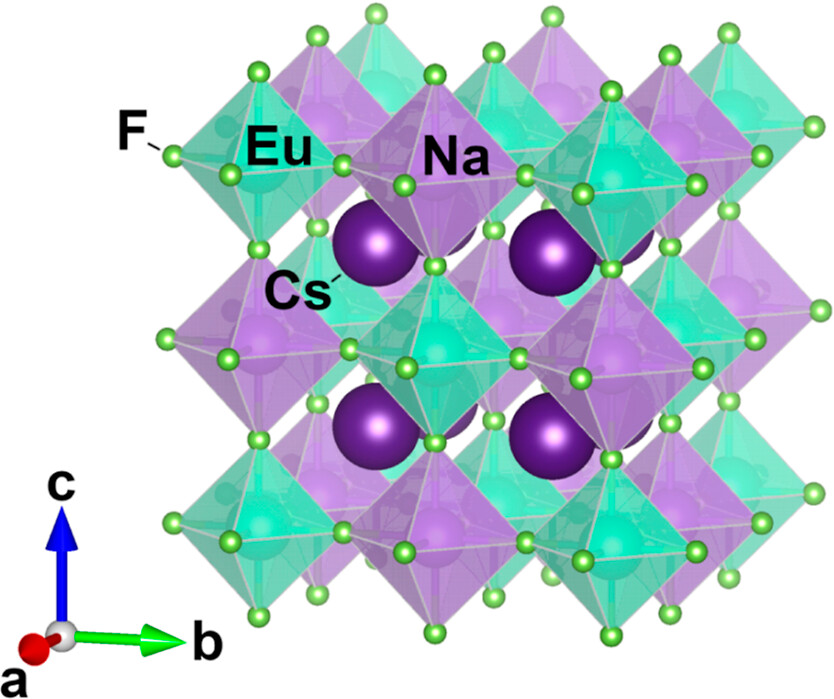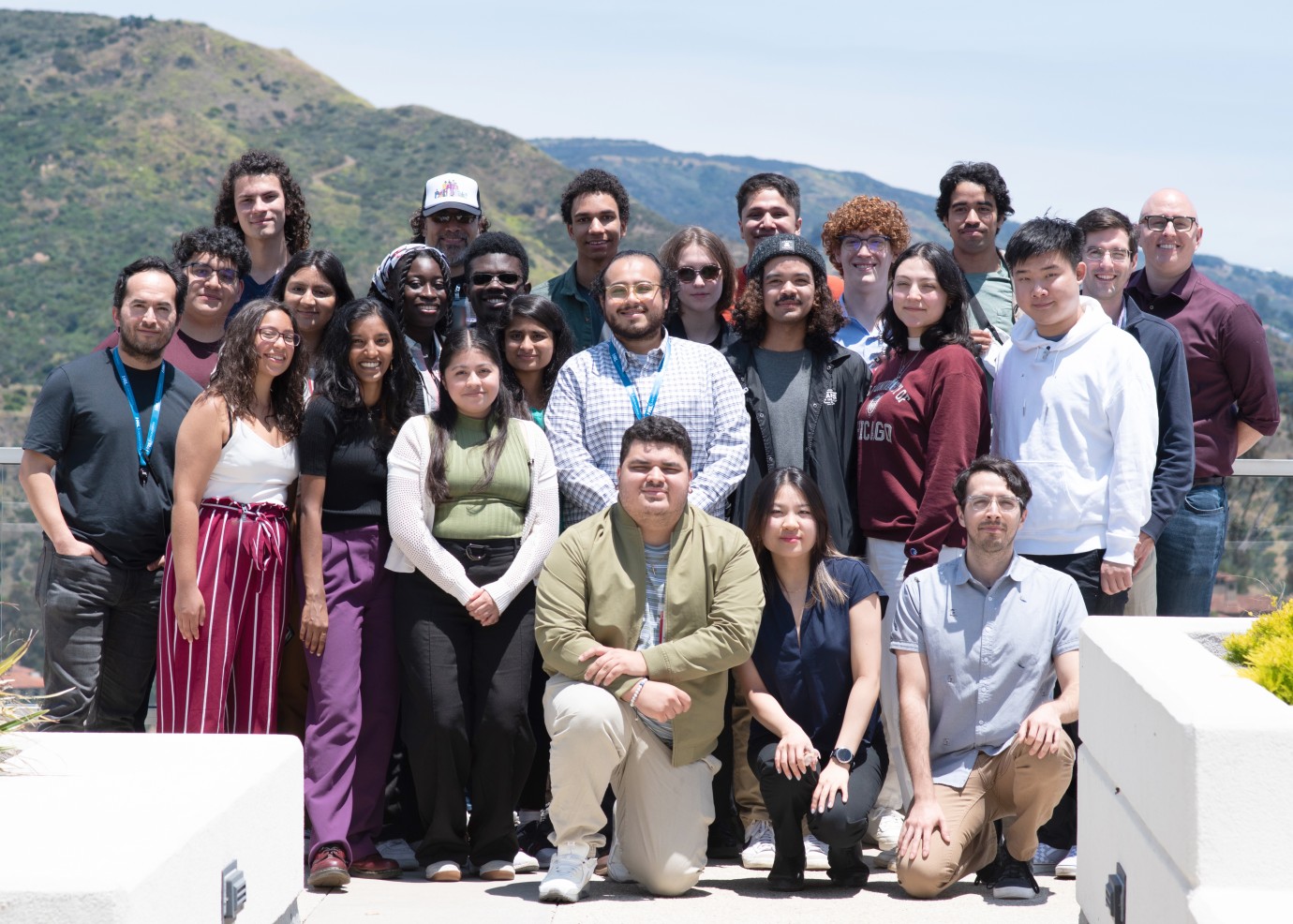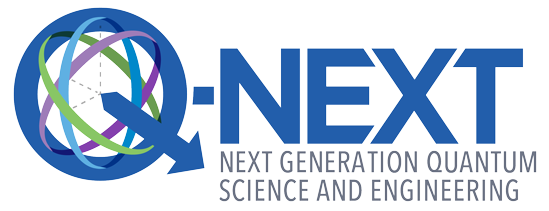University of Illinois Urbana-Champaign
-

Design rules and synthesis of quantum memory candidates
From the University of Illinois Urbana-Champaign: Researchers use density functional theory calculations to identify possible europium compounds to serve as a new quantum memory platform. They also synthesize one of the predicted compounds, a brand new, air-stable material that is a strong candidate for use in quantum memory Read More
-
Bringing quantum entanglement to the people
From the National Science Foundation: NSF’S Quantum Leap Challenge Institute Hybrid Quantum Architectures and Networks at the University of Illinois Urbana-Champaign, a Q-NEXT partner, has created a working demonstration that brings entanglement between photons to a public setting for the first time. Read More
-

Q&A with the 2023 Open Quantum Initiative fellows
Eight Open Quantum Initiative undergraduate fellows recently completed quantum research experiences that contributed to Q-NEXT R&D. In this Q&A, they share what they did this summer. Read More
-
Quantum capital of the world: emerging field that could solve ‘unsolvable’ problems
From WGN News: Chicago is aiming to become the quantum capital of the world. Public and private investment, workforce efforts, tech startups, and collaboration across academia, government and industry are all helping position Illinois as a leader in the quantum revolution. The WGN news piece features Q-NEXT Director David Awschalom and Q-NEXT collaborator Pranav GQuantum capital of the world: Emerging field that could solve ‘unsolvable’ problems okhale of Infleqtion. Read More
-
IQUIST Scholars: their experiences and how you can become one too
From the University of Illinois Urbana-Champaign: The Illinois Quantum Information Science and Technology Center announces the second year of the IQUIST Postdoctoral Scholar Program. The program gives selected scholars a chance to work with mentors to home in on research areas of high interest to them. Q-NEXT collaborator Jacob Covey, the program’s chair, said, “This program was created to attract talented candidates who may not have otherwise come to the University of Illinois.” Read More
-
Quantum quarterbacks: Pritzker’s a ‘geek’ for computing science that Emanuel calls ‘cutting edge of the next generation’
From the Chicago Sun-Times: Illinois Governor J. B. Pritzker and former Chicago Mayor Rahm Emmanuel are working to boost quantum research in Illinois and in Chicago. Governor Pritzker toured quantum labs at the University of Chicago in July and discussed QIS research with Q-NEXT Director David Awschalom and Q-NEXT members Hannes Bernien and Peter Maurer. Read More
-
Physicist Nadya Mason appointed dean of Pritzker School of Molecular Engineering
From the University of Chicago: Experimental physicist Nadya Mason has been appointed dean of the Pritzker School of Molecular Engineering at the University of Chicago, effective Oct. 1, 2023. A highly accomplished academic leader and elected member of the National Academy of Sciences, Mason is the Rosalyn S. Yalow professor of physics at the University of Illinois Urbana-Champaign, where she specializes in experimental studies of materials. Read More
-

Chitambar group establishes criterion for nonlocal quantum behavior in networks
From the University of Illinois Urbana-Champaign: In a study published in Physical Review Letters, Q-NEXT thrust lead Eric Chitambar and Amanda Gatto Lamas adapt techniques from quantum computing theory to create a new classification scheme for quantum nonlocality. This not only allowed the researchers to unify prior studies of the concept into a common framework, but it facilitated a proof that networked quantum systems can display nonlocality only if they possess a particular set of quantum features. Read More
-
Nadya Mason named a ‘Researcher to Know’
From the University of Illinois Urbana-Champaign: The experimental physicist, diversity advocate, and Beckman Institute director makes the Illinois Science & Technology Coalition’s list of Researchers to Know in 2022 for her “groundbreaking research driving innovation in the state.” Read More
-
IQUIST-NRIK collaboration to build the first quantum network with open-air links
From the Illinois Quantum Information Science and Technology Center: Q-NEXT research lead Paul Kwiat has joined an initiative led by the National Research Institute of Korea in which researchers will construct a distributed quantum network connecting nodes separated by 20 kilometers. Read More
In the News
See all In the News-
The best qubits for quantum computing might just be atoms
From Quanta: Mark Saffman of the University of Wisconsin–Madison and Infleqtion is featured in this comprehensive overview of neutral-atom qubit research. Read More
-
How quantum computing could help us understand the universe
From PBS NewsHour: David Awschalom appears in this piece on the next generation of computing, one that will be far more sophisticated and dependent on understanding the subatomic nature of the universe. Read More
-
PME-led research into protein-based qubits earns $2.75M Moore Foundation grant
Bolstered by a new $2.75 million grant from the Gordon & Betty Moore Foundation, a team led by University of Chicago's Peter Maurer will soon study qubits made from protein. Read More
-
Infleqtion unveils 5-year quantum computing roadmap, advancing plans to commercialize quantum at scale
From Quantum Insider: Infleqtion shares a broad business update, including the first look at its new 5-year quantum computing roadmap. The roadmap's centerpiece is Sqorpius, the next phase of Infleqtion’s quantum computing program. Read More
-
Bringing quantum entanglement to the people
From the National Science Foundation: NSF’S Quantum Leap Challenge Institute Hybrid Quantum Architectures and Networks at the University of Illinois Urbana-Champaign, a Q-NEXT partner, has created a working demonstration that brings entanglement between photons to a public setting for the first time. Read More
